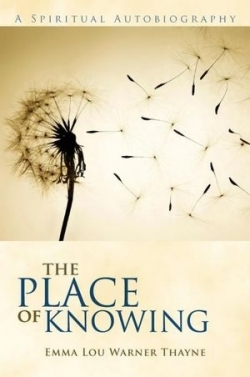The Place of Knowing
Since my accident, the nanoseconds, the smallest measure of time of my being back, mount up to years as the mystical connections multiply like stars in the heavens.
In 1986, Emma Lou Warner Thayne was the victim of a freak accident: while riding in the passenger seat of a car, an iron rod flew through the windshield, hitting her in the head before flying back and lodging in the rear window. The many injuries she sustained were complicated and perilous. Her vision was affected, teeth had to be replaced, and there were eight fractures in her cheek. The physical recovery, involving many surgeries, took months, and the mental recuperation, years.
Thayne was plagued by strange dreams, by a sense of guilt, and by a feeling that “[she] could remember having forgotten something.” Being a writer, she kept a diary and recorded details from her introspection. She tried to get beyond the specifics of the accident and move on with life, but the event continued to haunt her. Eventually, Thayne concluded that she had “died” on that fateful day of the accident, and that her new life afterward was a gift to be used wisely.
The Place of Knowing is filled with Thayne’s recollections, diary entries, and poems, all of which somehow connect to the crucial moment when she was struck by the iron bar. To readers, these connections may not seem so obvious. Thayne mentions none of the characteristics typically attributed to near-death experiences: a sense of being dead, a flashing review of her life, a feeling of peace, a vision of light, or a glimpse of a world beyond that might have given her a sense of security that something would be there waiting for her after this life. The fact that Thayne’s accident—and the operations and medical procedures that followed—resulted in none of these hallmarks may be confusing to some readers, and they might question Thayne’s analysis of her experience.
Thayne is now able to say with personal conviction, “I now know thoroughly that angels abide—miracles happen.” Her accident of twenty-five years ago has led her to understand that there is a “place of knowing” that can make life “a spiritual journey that is much more than a trip toward getting old.”
This book is a retrospective, and as such it can offer insights to those on a spiritual journey, as well as encouragement to those already familiar with Thayne’s unique approaches to spirituality; based on Mormonism yet borrowing from other religions and philosophies, they’re delivered in a free, tolerant way that is both surprising and refreshing.
The Place of Knowing is more personal than universal, but it can offer guidance to those who are drawn to her earlier works and also to new readers looking for an example of how a person can rise above adversity and accept the challenges of life.
Reviewed by
Barbara Bamberger Scott
Disclosure: This article is not an endorsement, but a review. The publisher of this book provided free copies of the book and paid a small fee to have their book reviewed by a professional reviewer. Foreword Reviews and Clarion Reviews make no guarantee that the publisher will receive a positive review. Foreword Magazine, Inc. is disclosing this in accordance with the Federal Trade Commission’s 16 CFR, Part 255.

